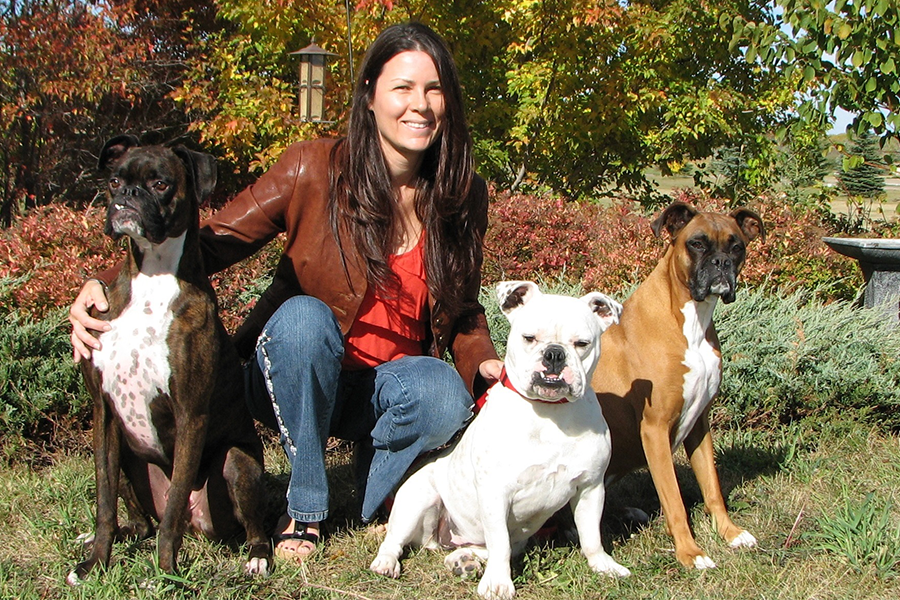
Canine care on campus
Since 2013, you’ve likely seen one or more therapy dogs on campus, bringing puppy peace to stressed students during exam season.
By Lesley PorterOne of the handlers, Colleen Dell, professor in the Department of Sociology and School of Public Health, and Research Chair in Substance Abuse, looks at the use of pet therapy and its effect on patient recovery and mental health.
So while you may have seen, or even petted, the dogs, how well do you really know them?
We sat down and spoke with Dell’s three therapy dogs—Anna-Belle, Kisbey and Subie—and learned about a typical day at the pawfice.
OCN: How did you three become therapy dogs?
Anna-Belle: Our human, Colleen, did some research a few years ago with horses and young girls in residential treatment for addictions. She saw how they benefitted from having an animal in their life and wondered if other animals, like dogs, could also help.
Subie: There’s a lot of research that shows how having a pet can lower anxiety and even blood pressure. Colleen keeps using this word, oxytocin. She said it’s a chemical your brain releases when you pet an animal. It’s what makes you feel all warm and fuzzy, which is how we pretty well feel all of the time already.
OCN: What training is required to become a therapy dog?
Kisbey: First and foremost, we have to be accepting of strangers. This includes people and other dogs or animals!
AB: There were also some training activities that demonstrate how well-behaved we are, including leash behaviour and walking through a crowd without being distracted.
S: And of course, listening to certain commands, such as sit or stay.
AB: Once we have demonstrated our talent and good behavior for the St. John Ambulance folks, we become certified therapy dogs. Subie and I passed the test in March 2013, and Kisbey joined our team six months later.
OCN: What work do you do on campus?
AB: Well, we know midterms can be a ruff time for students with the exams they are writing. Plus all those term papers we always get blamed for eating.
K: Humans always say they can feel the stress in the air. And actually, as a dog, we really can smell it!
S: It sort of smells like bacon.
K: Anyway, our goal is to bring a bit of joy to students’ day so they can conquer whatever challenges they might be facing.
AB: And there are some students who are just lonely or depressed, perhaps because they’ve moved to Saskatoon and are feeling lost in a new city. We want to make them feel better, too.
OCN: Do you work anywhere else?
AB: So glad you asked. We each have locations around the city that we visit regularly, in addition to campus visits. I visit the Brightwater Senior Living in Stonebridge monthly. I really love visiting the residents and staff there. Just like on the university, staff can get stressed too!
S: I visit the Calder Addictions Treatment Centre as well as the Métis Addictions Council of Saskatchewan.
K: I get a lot of love at the Lighthouse Supported Living and the Regional Psychiatric Centre.
AB: And all three of us take turns visiting the Sherbrooke Community Centre veteran’s village, thanks to some important research funding from Veterans Affairs Canada.
OCN: What are the qualities of a good therapy dog?
S: The number one quality of being a good therapy dog is that we have to like people. That means really, really enjoying what we do!
K: That also depends on who you’re working with, too. While we all get along with just about everyone, Subie has passed special tests that allow him to work more closely with young children.
OCN: What’s the best part of your job?
S: We’re not really sure how what we do is a “job.” We just show up and be ourselves and people seem to love us. So in a way, that’s the best part—that it doesn’t actually feel like a job.
K: People talk about how much better we make them feel, which is also nice to hear.
AB: And we love the attention from the wonderful people we spend time with—we are dogs, after all.
OCN: After a long day making people smile, what’s your favourite way to unwind?
K: I love to play Frisbee with Colleen.
S: A spoonful of peanut butter and a nice nap.
AB: Some quality time on my skateboard followed by a hearty belly rub.
The therapy dogs return to campus on Oct. 6 at 12:30 in the Murray library.

